Monitoring and Evaluation of Indonesia's National Infectious Disease Surveillance System (EWARS: Early Warning Alert and Response System)
2025.03.06
Between February 24 and 28, 2025, the JICA EWARS Project (Project for Strengthening Capacity for Early Warning and Response to Infectious Diseases) conducted an initial monitoring and evaluation (MONEV) trial activities for Indonesia's national infectious disease surveillance system, known as the Early Warning Alert and Response System (EWARS). This trial took place in East Kalimantan Province, in collaboration with the Ministry of Health (MOH). Monitoring and evaluation are essential for establishing and sustaining effective surveillance and response systems, which will ultimately contribute to strengthening infectious disease surveillance in Indonesia, which is the project's primary objective. This key activity aligns with the recommendations provided by the World Health Organization (WHO) in its 2023 evaluation report, which encouraged Indonesia to conduct regular assessments of its surveillance system at both national and subnational levels.
The activities began with an initial stakeholders’ meeting in May 2024, which included representatives from the WHO Country Office in Indonesia. This was followed by nine-month intensive discussions aimed at developing an evaluation framework and standardized evaluation sheets. The framework adopts an external cascade evaluation approach, with national authorities evaluating surveillance activities at the provincial level, provinces assessing district activities, and districts evaluating reporting units at the subdistrict level. As a result, three distinct evaluation sheets tailored to each target group were methodically developed, with many adjustments depending on stakeholder feedback. These questionnaires are structured to evaluate the surveillance system from eight different perspectives: facility environment, surveillance indicators, event- and indicator-based surveillance, laboratory testing, data management, response activities, and information sharing and communication. They include both qualitative and quantitative questions. Furthermore, online data collection forms for each questionnaire were created using Google Forms.
Prior to the field activities, an online briefing session was conducted with representatives from one provincial health office, two district/city health offices (Penajam Paser Utara and Balikpapan), and four Puskesmas (Penajam, Semoi II, Baru Ilir, and Damai) in East Kalimantan Province. During the on-site evaluations at seven locations, Indonesian officials conducted interviews and data entry in accordance with established methods, utilizing the developed questionnaires and online data entry platform. Assessment summaries were prepared based on a predetermined format and promptly delivered to each evaluation subject during the activity. Two wrap-up sessions were held on the middle and final days of the activity to discuss findings and challenges, as well as identify areas for improvement.The monitoring and evaluation activities was also highlighted at a meeting organized by the Balikpapan City Health Office, which was attended by representatives from all Puskesmas within the city.
Furthermore, the provincial health office, Puskesmas Damai, and Puskesmas Baru Ilir publicized our visit and the MONEV activities on their Instagram.
Provincial health office: https://www.instagram.com/p/DGc6HNJyKfL/?igsh=dWF6ZzJzeG84dGYy
Puskesmas Damai: https://www.instagram.com/reel/DGnc83QSzoU/?igsh=YjliMWN0NzVyMDJu
Puskesmas Baru Ilir: https://www.instagram.com/reel/DGk5giiSSie/?igsh=MTB3bHY1MHFyZnd2dw==
This initial trial provided valuable insights for improving questionnaire content and planning larger-scale future implementations. Furthermore, it highlighted an important lesson: evaluation is not about assessment but also about learning. Exchanging ideas through interviews facilitated knowledge exchange among stakeholders, informing evaluators of challenges and best practices related to surveillance activities in the field, and enhancing respondents' comprehension of standard procedures in surveillance. As a result, the MONEV activities was deemed beneficial for both evaluators and respondents, with participants giving it a 4.9 out of 5 grade for usefulness. They also rated the feasibility of periodically implementing MONEV activities, on a scale of 4.5 out of five. Looking ahead, the JICA EWARS Project will amend the evaluation sheets based on the input from the trial and will collaborate with the MOH to discuss future implementation plans.
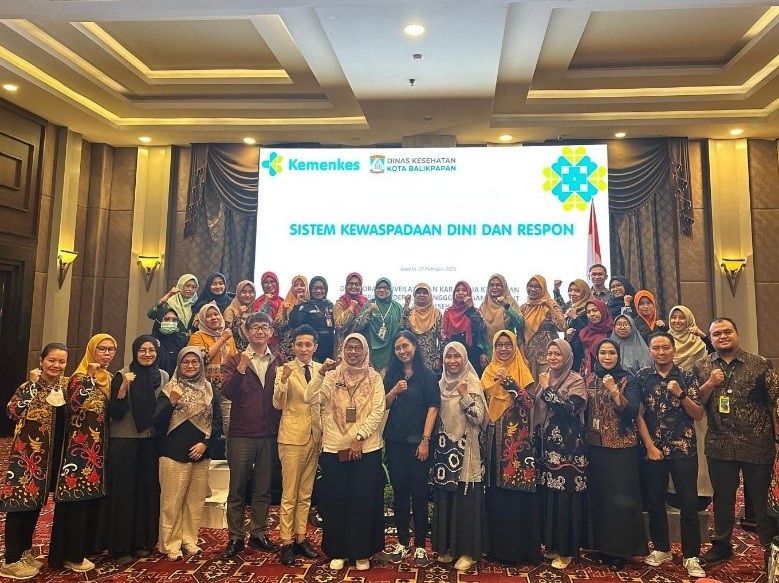
Group photo at the meeting in Balikpapan City.
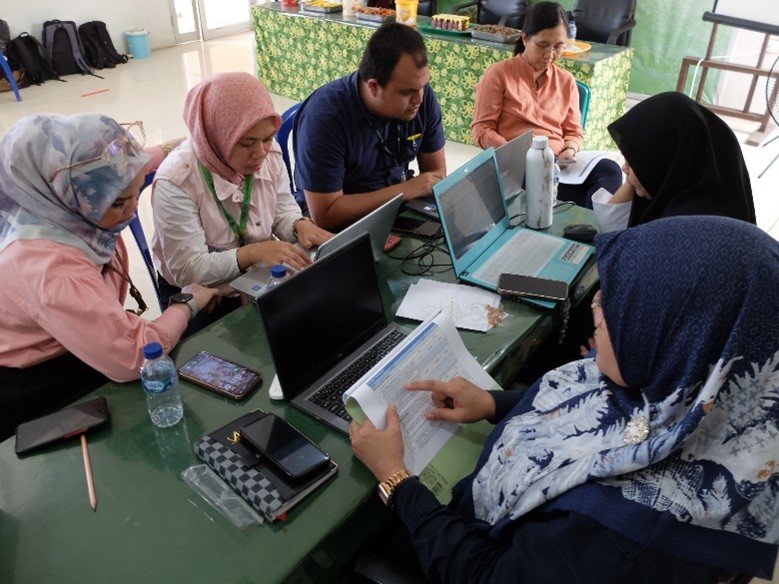
Interview using the developed evaluation sheets.
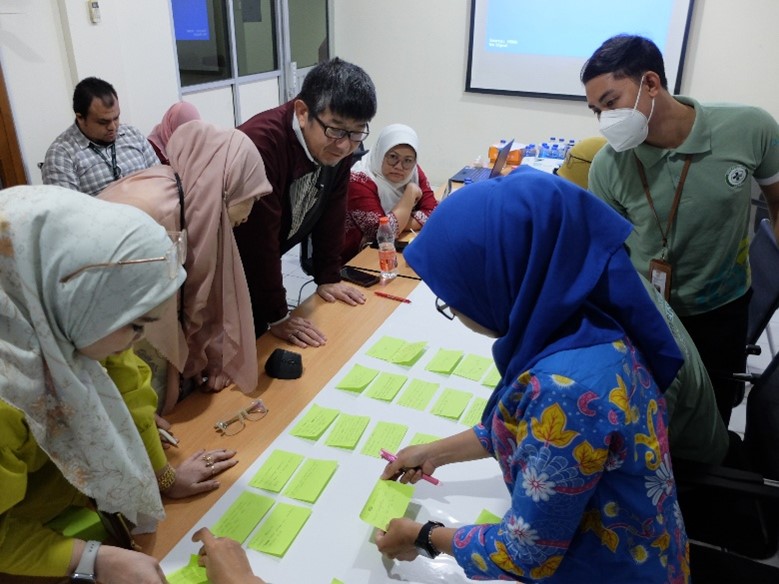
Wrap-up workshop at Puskesmas Damai.
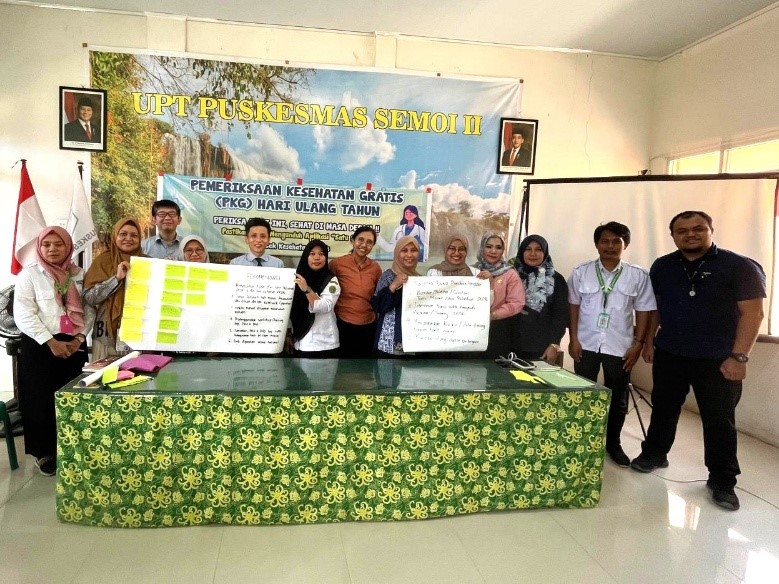
Group photo displaying workshop results at Puskesmas Semoi II.
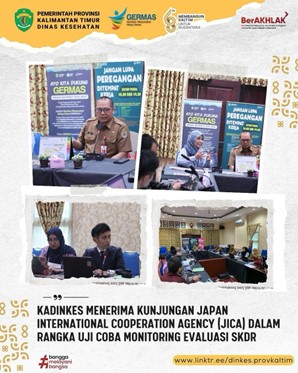
Instagram Post by the East Kalimantan Province Health Office.
scroll